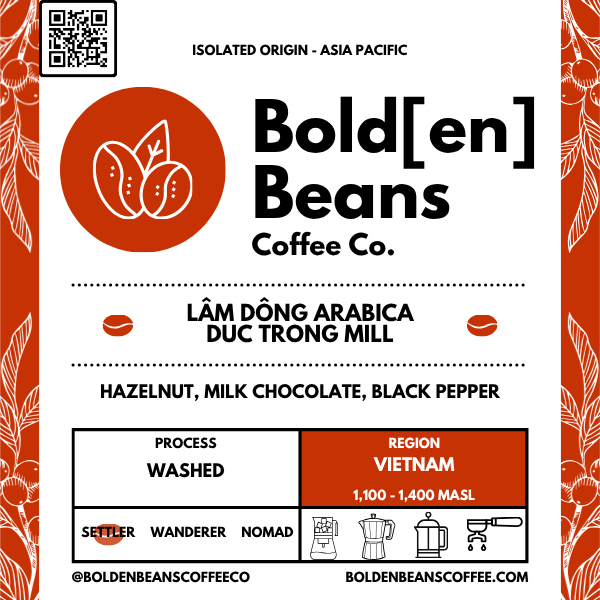
Coffee Club April '25 Drop - Peaberry
Share
Unlocking the Mystery of Peaberry Coffee: Why This Rare Bean Is Worth a Try
At Bold[en] Beans, we're all about exploring the bold, the unique, and the underappreciated in the world of coffee—and peaberry coffee checks every box.
You may have seen the term peaberry on a coffee label or menu and wondered what sets it apart. Is it a different species? A special roast? A marketing gimmick?
Let’s clear things up and share why this rare little bean deserves a place in your brew rotation.
What Is Peaberry Coffee?
In most coffee cherries, two seeds grow side by side, flat on one side and rounded on the other. But in about 5% of coffee cherries, something different happens—only one seed develops. This solo seed grows into a small, round bean known as a peaberry.
This natural mutation can occur in any coffee variety, but peaberries are often separated during processing because of their unique size and shape.
What Makes It Different?
The peaberry isn’t just shaped differently—it roasts differently too. Because of its roundness and denser structure, it rolls more evenly in the roaster drum and tends to develop a slightly different flavor profile than its flat-bean counterparts.
Expect a cup that’s:
-
Brighter in acidity
-
Smoother in body
-
More concentrated in flavor
Think of it as the espresso shot of the coffee bean world—smaller, more intense, and packed with character.
Is Peaberry Coffee Better?
“Better” is subjective—but if you're into exploring new coffee experiences, peaberry is a must-try. The flavor difference is subtle but noticeable, especially in single-origin coffees where terroir shines.
Some describe peaberry coffee as sweeter, more complex, and more vibrant, particularly in Tanzanian and Kenyan varieties.
Why It’s Worth a Try
-
Rarity: Only about 5% of beans harvested are peaberries.
-
Distinct Taste: A smoother, livelier cup with an edge of sweetness.
-
Roaster’s Favorite: Roasts evenly and predictably, making it a joy to work with.
At Bold[en] Beans, we love peaberry not just for its flavor, but for what it represents—something unexpected, natural, and full of personality. Just like your morning cup should be.
Curious to try it?
We occasionally feature peaberry offerings in our limited releases, but if you join Coffee Club this month we are featuring an ALL PEABERRY offering.
KENYA Kirinyaga - Rungeto Peaberry
grapefruit, baking spice, molasses
Perched high up in the southern foothills of Mount Kenya on rich red volcanic soil, the areas surrounding the Kii factory are ideal for producing some of the finest Kenyan coffee. Farmers in these fertile foothills who typically cultivate around 250 coffee trees on half-acre plots have been delivering cherry to the Kii factory, which is one of 3 factories managed by an umbrella farmers’ cooperative society (FCS) called the Rungeto Farmers’ Cooperative Society. Smaller in size than other FCS, Rungeto has focused on quality processing and meticulous attention to detail, garnering it a reputation for amazing coffee and some of the cleanest and best organized factories in Kenya.
At the Kii factory only the ripest cherries are delivered, and additional hand sorting and floating is done to remove less dense and damaged beans before the coffee is depulped, fermented and washed. After the coffee is washed, it’s soaked in fresh water for long periods of time to solidify the hallmark Kenyan profiles.
The coffee is dried over a period of two weeks on raised beds, which are carefully constructed to ensure proper air circulation and temperature control for optimal drying. When the coffee is milled for export, the green beans are sorted by screen size and graded according to size and shape. Larger beans (17/18 screen) are labeled AA, 15/16 screen are labeled AB, and the round peaberry are labeled PB.
TANZANIA - Luyombe Peaberry
grapefruit, coffee blossom, nutmeg
Luyombe is a coffee-producing area in Tanzania, known for cultivating high-quality Arabica beans. The region’s coffee is typically grown at elevations ranging from 1,000 to 2,000 meters above sea level, benefiting from fertile volcanic soils and a temperate climate ideal for coffee cultivation.
Luyombe is known for their washed Peaberries. Peaberry beans are unique, as they develop as a single, rounded bean within the coffee cherry, unlike the typical two flat-sided beans. This natural mutation occurs in about 5-10% of coffee cherries and is often associated with a more concentrated flavor profile.
Tanzanian coffees, including those from Luyombe, are known for their bright acidity and complex flavor profiles. Common tasting notes include black currant, chocolate, and a sweet, fruity aftertaste.
The coffee industry in Tanzania is vital to the country’s economy, with approximately 90% of farms managed by smallholder farmers.
